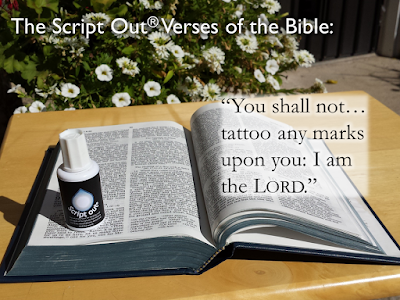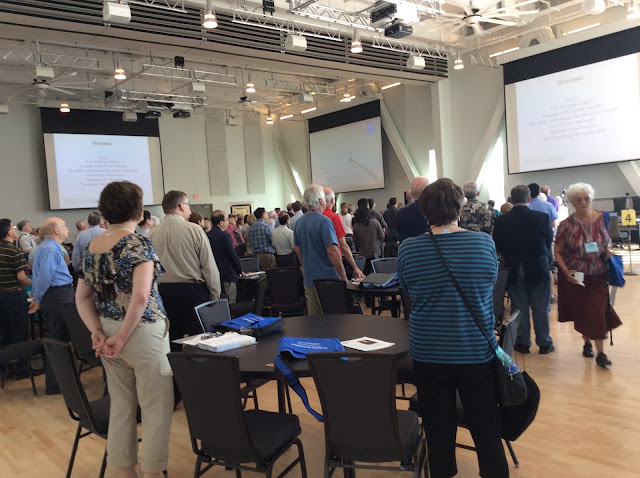The Invention of Script Out

The Script Out Verses of the Bible: “You shall not tattoo any marks upon you: I am the Lord.”
| I |
 I’m not talking about that kind of Bible study tool. Anybody can sell you a tool that you can use to mark or annotate or find your favourite passages. But, let me ask you, when was the last time someone offered you the kind of tool that you really need – something to help you with the passages you don’t like, the ones that you maybe even hate. And don’t try and tell me that you love the whole Bible and you couldn’t possibly dislike anything that it says because it doesn’t matter how much you love and respect the Bible. You could be the most conservative, Bible thumping fundamentalist or the most liberal, critical thinker or anyone in between. You have some passages that you just wish weren’t there. They may be different passages based on what your position is, but you’ve got them.
I’m not talking about that kind of Bible study tool. Anybody can sell you a tool that you can use to mark or annotate or find your favourite passages. But, let me ask you, when was the last time someone offered you the kind of tool that you really need – something to help you with the passages you don’t like, the ones that you maybe even hate. And don’t try and tell me that you love the whole Bible and you couldn’t possibly dislike anything that it says because it doesn’t matter how much you love and respect the Bible. You could be the most conservative, Bible thumping fundamentalist or the most liberal, critical thinker or anyone in between. You have some passages that you just wish weren’t there. They may be different passages based on what your position is, but you’ve got them.My Report to the Congregation on General Assembly 2015
Same Words, Opposite Application
Spiritual but not Religious – My Reasons for Dissent
Today at General Assembly, we opened up the terms of reference for the standing committee on Ecumenical and Interfaith Relations. In the midst of those discussions, the point was made that nowhere in the mandate of this committee were there any instructions regarding our relationship with the fastest growing belief group in Canadian society - those people who see themselves as "spiritual but not religious."
I strongly felt that we really could not say that we were engaging in interfaith dialogue if we completely ignored such a large and influential group in Canadian society - even if they are not organized as most religious groups are. (Indeed they fiercely resist any organisation, that's kind of the point.)
So I proposed an ammendment that would address that important lack.
Spoiler alert for those who are waiting to read it in the minutes, my motion was soundly defeated.
But I did dissent and asked for an opportunity to have my reasons recorded. I would like to share those reasons now.
My Dissent
I wish to record my dissent regarding the defeat of the amendment to the second recommendation of the Ecumenical and Interfaith Relations Committee report.
In the debate over my amendment, there were certain points that were made that I feel must be answered.
It was said that our discussions with the group of people in Canadian society who see themselves as spiritual but not religious is a matter of evangelism and not interfaith dialogue.
I disagree. This is what was said not too long ago when it came to discussions with Muslims or Buddhists or other religious groups. We have since learned that this was a very flawed approach and that any dialogue must take place in an environment of respect, appreciation and understanding of the beliefs of the other. How can it be any different in our discussions with our "spiritual but not religious" neighbours?
It was said that this committee is only set up to dialogue with organized faith groups and so can do nothing about engaging such a disorganized and uncohesive group.
I would say that, if that is what stands in the way, then it is time to change our approach. Organized religion is quickly going the way of the dodo in Canadian society. If we do not learn how to engage with unorganized faith groups we will be totally cut out of a vital interfaith dialogue before we know it.
It was said that this kind of dialogue is best carried out by individual Christians in our congregations.
I agree. But if that dialogue is to take place with respect and understanding of the belief system of the people we are talking to, the people in our congregations will need much help and guidance. Who will give them that guidance if not Ecumenical and Interfaith Relations, then who?
That final question is not rhetorical. I am seeking some guidance.
Who Cares
Bluebirds
How the LGBTQ conversation has changed. A subtle shift that actually means a lot.
I reassured her that, while there were many Christians who I thought and acted like her Christian friend did, it was definitely not the only faithful Christian way of looking at the issue. Her friend's interpretation of the Bible was not the only one that people who take the Bible seriously could come to.
Anyways, I tried to do my best to help her through what she was dealing with. I know that some might not I agree with my response and some might think that I didn't go fair enough, but I think it was the right response at the time.
But Now it is Happening differently
The reason why I bring up this past event today, though, is because I've noticed that it doesn't actually happen like that anymore - at least not for me. The young people connected to my congregation are still experiencing their own struggles as they work through LGBTQ issues and they are still looking to me for some help, but the issue isn't presenting itself in quite the same way now.
But here has what has changed. The people who are challenging them over what some would see as the contradiction between their acceptance of LGBTQ people and their Christian faith are not their Christian friends. The people who are challenging them are their atheist, agnostic or generally anti-religious friends. They are the ones who are telling them that hatred of LGBTQ people necessarily goes with religious faith, that there it's no other way to look at it and that that is a major reason why religion must be rejected.
What does it mean?
I would suggest, first of all, that it means that the those who would take the view that Christianity demands the rejection of LGBTQ people have won the messaging battle. They have successfully convinced the vast majority of people that their approach is the only Christian approach. That makes it much harder, and yet so much more important to stake out a moderate place to stand.
Packing for General Assembly
I think I may have to make some tough decisions to make. I've already decided that I'm not going to take my laptop and I may have some withdrawal issues there! And, as much as I like to talk up my book, I'll probably only be able to bring a few copies. But what else might I have to leave behind? What will I just not be able to fit?
An Open Mind
As many will know, this General Assembly has received an unprecedented number of overtures that touch on LGBTQ issues. Normally, when these kinds of overtures are received, there isn't a lot of discussion to be had during the assembly because they are simply sent off to some committee or another to bring back a report to a future assembly. I was glad to see that this time that is not what is going to happen. There are plans to block out a substantial amount of time to discuss the issues and the impacts of change in table groups and in other ways. This process will be led, most ably I am certain, by the Moderator, Karen Horst.
Scriptural Baggage
Nope, I don't have room to pack my Bible. The thing will just take too much space. But that is okay because I do have the Bible on my Ipad mini. Anything I read during the week, it will have to be from that. But it's not just about how much physical space my Bible takes up. I am also wondering how much space the Bible will take in our considerations.
1) Genesis 19
2) Judges 19
3) 1 Timothy 1
4) Leviticus 18 / 20 (Both chapters say basically the same thing)
5) Romans 1
6) 1 Corinthians 6
As far as I can see, Genesis 19 and Judges 19 do not really apply to our discussions. They are accounts of attempted gang rape that is rightfully condemned. We're not talking about tolerating rape so they hardly apply. Since 1 Timothy is merely a reference to the immorally of what happens in Genesis 19, it also doesn't apply.
The Leviticus passages also don't really apply. They are part of a holiness code - intended to set the Hebrew people apart from their neighbours in primarily cultural ways. We regularly ignore many of the precepts of the holiness code and conclude they don't apply to us so there is no real reason to think that these teachings should apply to us.
That leaves the two brief passages that come to us from the Apostle Paul (no, I don't think that Paul wrote 1 Timothy, but that is another discussion). I tend to think that, what the apostle is rejecting in these passages is the sorts of same sex relations that he observed or heard about in his world - relationships that were not consensual and that generally reflected one person exercising power over another. We wouldn't want to affirm those kinds of relationships either.
Also, I think that Paul is clearly operating out of a very different understanding of the issue from the one that we must confront. We understand the issues in terms of sexual orientation and how people may best live out their lives with the orientation that is a given for them. This is a way of talking about these things that was completely foreign to any understanding in the ancient world. That means that we and Paul are not exactly talking about the same thing.
But... what if I am wrong. What if a deep examination of the passages, the original language, the full historical context demands that I conclude that Paul really intended for these passages to apply to our judgments in the modern world? Would that make me change my mind? I don't think so. I am not inclined to allow a couple of passages, even if their interpretation were crystal clear, overrule what I see as the central Gospel message of treating the outsider with respect - a message of acceptance and grace.










